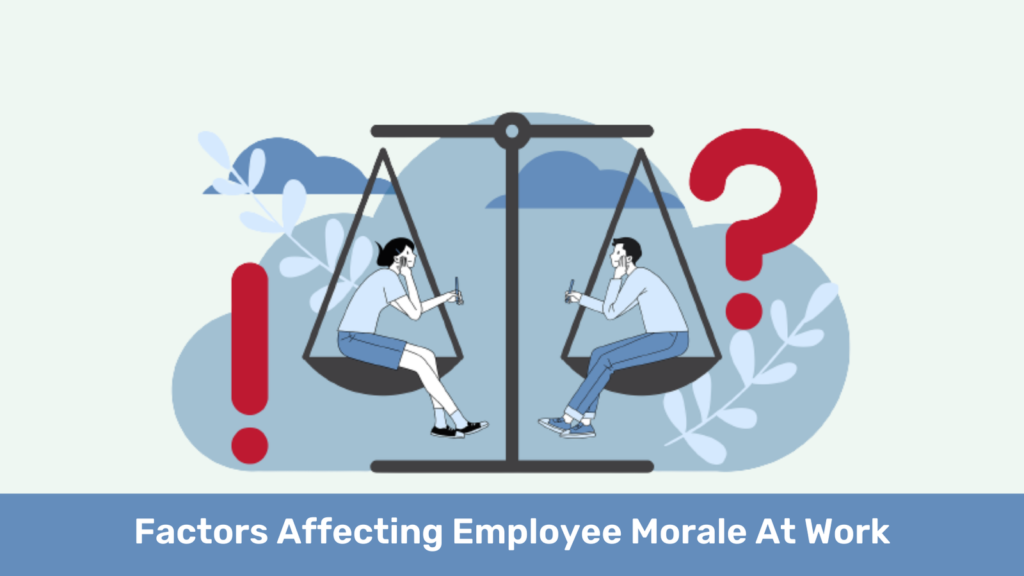Introduction
Employee morale plays a critical role in shaping the overall well-being, productivity, and success of an organization. There are numerous factors affecting the employee morale, and understanding these factors is essential for creating a positive work environment.
No matter what industry you’re in, you recognize that your company’s employees are its lifeline. There’s no need to cut corners when it comes to developing long-term employee loyalty. Any effort to reduce employee turnover is worth the investment.
In particular, you should consider optimizing your organization’s employee morale. The good thing is that you’ve come to the right article, though. Detailed below are all of the most crucial factors affecting employee morale.
Not only will higher morale reduce the company’s consistent employee turnover rate. In addition, you can expect the organization’s profit margins to increase alongside that morale.
Plus, even the American Psychological Association suggests that an unhappy workplace is dangerous. According to these experts, poor workplace morale can result in medical conditions like depression and heart disease. Keep your company and its employees thriving with the following suggestions to boost morale in the workplace.
Top 8 Factors Affecting Employee Morale at Work
-
Leadership and Management
Effective leadership and management practices have a profound impact on employee morale. Managers who exhibit strong leadership qualities, provide clear direction, communicate effectively, and show genuine concern for their team members’ well-being create a positive work environment. Regular feedback, recognition, and opportunities for growth and development are also critical factors in boosting morale.
-
Communication and Transparency
Open and transparent communication is crucial for fostering trust and confidence among employees. When employees feel well-informed about organizational goals, decisions, and changes, they are more likely to feel engaged and connected to the company’s mission. Encouraging two-way communication channels, such as team meetings, feedback sessions, and employee surveys, allows employees to express their thoughts, concerns, and ideas, promoting a sense of ownership and inclusion.
-
Work-Life Balance
Maintaining a healthy work-life balance is essential for employee well-being and morale. Organizations that prioritize work-life balance through flexible work arrangements, wellness initiatives, and policies that support personal time and boundaries demonstrate a commitment to their employees’ overall well-being. Striking a balance between professional and personal responsibilities helps prevent burnout, improves job satisfaction, and enhances morale.
-
Recognition and Rewards
Employees thrive when their contributions are acknowledged and appreciated. Recognizing employees’ achievements, both big and small, boosts morale and reinforces a positive work culture. Effective recognition programs that align with organizational values and provide meaningful rewards, such as public recognition, monetary incentives, or professional development opportunities, can have a significant impact on employee morale and motivation.
-
Job Security and Stability
Uncertainty and fear regarding job security can significantly impact employee morale. Organizations that provide a sense of stability through fair employment practices, transparent performance evaluations, and opportunities for career growth and advancement foster a positive work environment. When employees feel secure in their positions and see a future within the organization, they are more likely to feel motivated and committed.
-
Teamwork and Collaboration
A strong sense of teamwork and collaboration promotes camaraderie, support, and a positive work culture. Encouraging collaboration through team-building activities, cross-functional projects, and a supportive work environment fosters a sense of belonging and camaraderie among employees. When employees feel valued and supported by their peers, it enhances their morale and overall job satisfaction.
-
Fairness and Equity
Employees value fairness and equity in the workplace. Organizations that promote fairness through transparent and unbiased policies, equal opportunities for growth and advancement, and equitable compensation and benefits create a positive work environment. Treating all employees with respect and providing a level playing field fosters trust, motivation, and high morale.
-
Work Environment and Physical Well-being
The physical work environment significantly impacts employee morale. A clean, comfortable, and well-equipped workspace promotes productivity, creativity, and overall job satisfaction. Additionally, organizations that prioritize employee health and well-being by offering wellness programs, ergonomic workstations, and opportunities for exercise and movement contribute to higher morale and engagement.
Also Read: 6 Simple Ways to Improve Employee Morale
Final Thoughts
The factors affecting employee morale are multi-faceted and can significantly impact the overall well-being and performance of individuals within an organization. Understanding and addressing these factors is essential for fostering a positive work environment, enhancing employee engagement, and driving productivity.
At this point in the article, you’re prepared to invest in strategies to boost your organization’s employee morale. You recognize the value of doing so. If you want to boost profits and maintain employee loyalty, you’ll take the above suggestions seriously.
Remember, you don’t have to manage your employees’ happiness levels all by yourself. That’s why wellness corporate solutions companies exist in the first place. Their guidance and expertise can help you navigate the tricky ins and outs of your employee management.
In fact, that’s where Woliba come into play. We prioritize bringing clients like you the latest and greatest employee engagement solutions. We want to help your company culture (and, therefore, its profit margins) to grow and thrive.
Contact us now to know more about Woliba.









